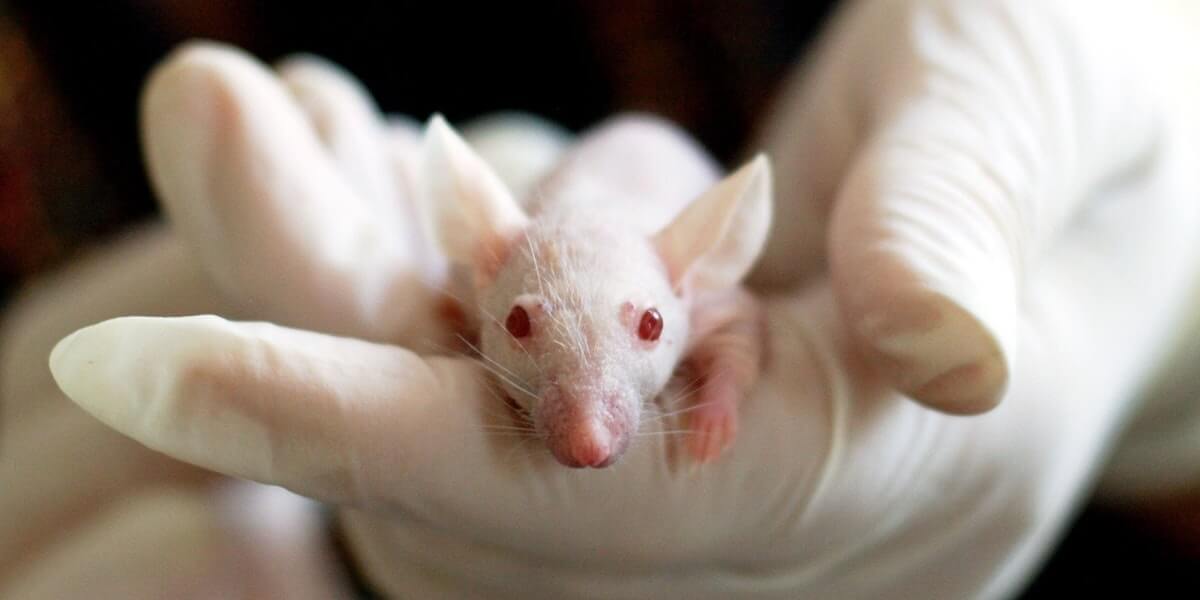PETA Finds That Yet Another Mouse Burst Into Flames in NIH Laboratory
Update: March 3, 2022
PETA has uncovered a fresh raft of animal welfare violations in National Institutes of Health (NIH) laboratories, including an instance in which, almost unbelievably, a mouse burst into flames. And it was the second time this happened! PETA exposed the first incident in July.
In this round, PETA found an additional 13 animal welfare violations—that’s more than four a month—in NIH labs that occurred between September 3 and November 23, 2021. The litany of acts of abuse is frighteningly similar to previous violations we uncovered: Incompetent staff allowed mice to starve to death, faulty record keeping left monkeys without water for days on end, a mouse was killed after suffering for days without pain medication following invasive surgery, and 15 others were subjected to experimental surgeries without any pain meds at all. Incompetent staff also killed 103 cavefish by neglecting proper tank setup, and in two separate incidents, staff injected mice with tumor cells—even though this procedure had not been approved—and then failed to monitor them. In one case, the tumor cells were very aggressive and mice were “progressing beyond the expected endpoints”—which likely means that the tumors had grown very large, causing the animals considerable suffering. And laboratory workers were possibly exposed to a toxic chemical after staff failed to label cages properly.
PETA has fired off a third letter to NIH brass, demanding explanations and action on these and the more than 100 other violations we’ve found.
Originally published December 7, 2021:
After PETA unearthed a slew of federal case files documenting almost unimaginable suffering and death at the hands of experimenters at the National Institutes of Health (NIH), we’re calling on the agency to implement a zero-tolerance policy for experimenters who fail to comply with approved protocols and directives from veterinary staff. We’re also calling for a zero-tolerance policy for animal husbandry staff at NIH who fail to provide animals with necessities such as food, water, and safe shelter.

As a federal agency, NIH is fully funded through tax dollars—receiving more than $41 billion in the fiscal year 2020. Its experimenters must be informed that failure to comply with minimum animal welfare laws and guidelines undermines crucial public faith in the agency and public trust in the system of oversight of NIH laboratories that use animals.
Federal reports document serious animal welfare violations in the government laboratories at NIH, including the following:
- Employees’ ongoing negligence resulted in the deaths of 19 mice in six separate incidents because experimenters had failed to provide them with access to food and/or water.
- Seven mice died after exposure to extreme heat of at least 90 degrees while trapped inside a cage. Heat exposure in mice would likely have caused a systemic inflammatory response, which would have resulted in pain and distress as well as multiple organ failure.
- A mouse went unnoticed inside an enrichment tube of a cage and was scalded to death when the cage was run through a mechanical, high-temperature cage washer.
- Twenty mice were injected with an overdose of insulin, against protocol, and died or were euthanized.
- A mouse with an infected, necrotic complete uterine prolapse was inappropriately treated with ointment and kept alive rather than being immediately euthanized per institutional policy.
- NIH experimenters repeatedly failed to follow approved euthanasia protocols in the agency’s laboratories. A juvenile mouse was found alive inside a refrigerator after experimenters failed to follow approved euthanasia protocols, and one mouse was found still alive in a carbon dioxide gas chamber while the gas flow was shut off.
- Live baby mice were thrown out with the trash. They were discovered inside a clear trash bag containing discarded bedding material from cage changes and were killed.
This isn’t the first time that PETA has pulled back the curtain on violations in NIH’s laboratories.
Such problems will continue unless a strong deterrent is implemented and a path is forged for moving forward that optimizes our nation’s investment in biomedical research to cure disease, while eliminating ineffective experiments on animals.
Take Action for Animals in NIH Laboratories
Urge President Joe Biden to appoint a new, forward-thinking NIH director who favors modern science and opposes experiments on animals.

